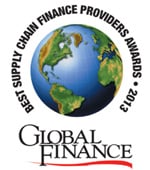UNLOCKING HIDDEN POTENTIAL
By Anita Hawser and Paula L. Green
Global Finance presents the winners of its annual awards for the Best Supply Chain Finance Providers globally and by region.

Five years have passed since the global financial crisis, when governments and export credit agencies and multilateral development banks were forced to intervene to keep the wheels of global trade turning. For many companies, particularly small-to-midsize suppliers in emerging markets with no credit rating, supply chain finance has become their main or only source of finance.
The global banks are focused on their core markets and clients, but often it is the more developed markets that have a high sovereign rating, and their core customers tend to be multinationals with a Triple-A credit rating. However, most companies’ supply chains are made up of suppliers in countries like Bangladesh, Vietnam and even China. Often these companies have a low credit rating or none.
Supply chain finance has yet to penetrate these regions of the world, although banks and nonbanks report increasing activity in regions such as Asia as local companies find it increasing difficult to gain access to traditional bank financing. Instead, suppliers are leveraging the balance sheet of their large, creditworthy buyers in order to get paid earlier.
Other forms of supply chain financing are starting to focus more on the supplier to unlock working capital in inventory and pre-shipment, but this approach still remains in the minority and tends to be confined to those financial service providers that have the relationship with buyers as well as suppliers and who are willing to look beyond the suppliers’ balance sheet to try and understand the strength of trading relationships. It is here that Web-based collaborative networks built by the likes of Ariba—and the merged entitiy of GT Nexus and TradeCard—are helping to provide the level of transparency financial providers need in order to channel financing to different parts of the supply chain when it is needed. These platforms deliver a wide range of supply chain solutions and ancillary services, such as e-invoicing, online discount management and e-procurement in the Cloud, that help automate paper-based processes (purchase orders, invoices) and provide visibility right down to the factory floor level.
But there is no question that more could be done, and it is here that the likes of the IFC, the Asian Development Bank and the US Ex-Im Bank are working to provide the guarantees, or in some cases the financing, that enables suppliers in a number of emerging markets to get paid earlier and enhance their working capital cycle. These awards recognize those banks and nonbanks, technology companies, network providers, risk management consultancies and ratings agencies that play an integral part in oiling the wheels of companies’ global supply chains. No one bank, no one platform or financial services provider can sustain global supply chains on its own. Supply chain finance requires an ecosystem of providers, platforms and technologies to meet an ever-growing demand for financing, transparency and automation in different parts of the globe, wherever multinational buyers seek to do business with suppliers.




